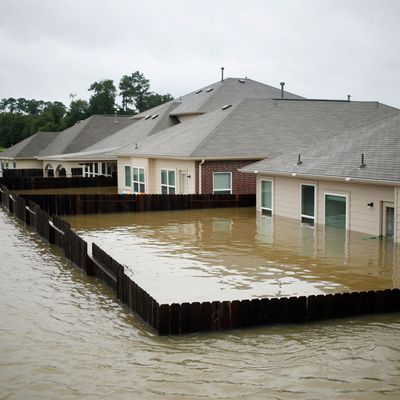
It’s not totally a coincidence, since this is both hurricane season and the end of the federal fiscal year, when federal programs often have to be renewed. But still: The vast damage from Hurricane/Tropical Storm Harvey is occurring on national television just as the federal flood-insurance program is up for reauthorization. And an added twist is that the congressman who has been crusading for reforms in the program to expose homeowners to higher premiums and in some cases to forced relocation is Texas’s own Representative Jeb Hensarling.
The flood-insurance program is deeply in debt, to the tune of nearly $25 billion, mostly thanks to premiums that don’t keep up with payouts and a steadily increasing number of catastrophic storms. That bugs conservative Republicans, who also frequently express annoyance at the number of people (and developers) who build and rebuild homes in flood-prone areas and then turn to Uncle Sugar for relief when the inevitable flooding recurs. But these conservatives, led by Hensarling, have also been joined by environmentalists who want to stop the coastal overdevelopment that makes flooding more likely (by removing the natural flooding protection that wetlands provide) and more damaging and expensive. It’s a potentially powerful coalition for reform.
But we’ve seen this movie before: Congress enacted major flood-insurance reform legislation in 2012:
Years of legislative wrangling resulted in the Biggert-Waters Act, which, among other things, ordered FEMA to stop subsidizing flood insurance for second homes and businesses, and for properties that had been swamped multiple times. There would be some pain, yes, but to soften the blow, the law directed FEMA to spread out the rate increases over four to five years. Congress also asked FEMA to conduct an affordability study to see how the new rules could be administered without leaving people in the poorhouse — or with no house at all.
But then Super Storm Sandy struck. And Congress promptly unraveled most of the reforms provided for in Biggert-Waters. So Hensarling is trying to push that rock back up the hill, and again, a big storm — this time not that far from his own Dallas-based congressional district — could frustrate would-be flood-insurance reformers.
To a considerable extent, the flooding from Harvey proves the case for flood-insurance reformers better than perhaps any other recent storm. There are an estimated 140,000 homes in Houston in the 100-year flood plain; the city has had eight hundred-year storms since 1989 (and three 500-year storms the last three years in a row). And one current estimate suggests there are 373,000 federal flood-insurance-backed policyholders in the area being affected by Harvey-related flooding.
But for that very reason, support for flood-insurance reforms that might boost premiums, force flood mitigation efforts, or even deny insurance at all to people in frequently flooded areas, aren’t likely to go over very well at this particular moment.
So far Hensarling isn’t letting Harvey change his mind about the need for reform:
As his state’s largest city is pounded by extreme rain, Rep. Jeb Hensarling is digging in his heels on a conservative vision for overhauling the heavily indebted National Flood Insurance Program, which protects millions from the risk of financial calamity.
The Texas Republican, who as chairman of the House Financial Services Committee is spearheading efforts to revamp the program before it expires next month, will call on his colleagues to pass his proposal as soon as they return from recess.
Good luck with that, in the current environment.
His characteristic steadfastness puts him at odds with other lawmakers, aides and lobbyists who suggested Congress was more likely to advance a less ambitious flood insurance package, including potentially a short-term extension bill without significant reforms.
“Hurricane Harvey makes a rapid reauthorization of the NFIP — in its current form — more likely,” a House Republican leadership aide said. “Considering the ongoing disaster in Texas and the fact we are not even halfway through hurricane season, I think there will be immense public and political pressure to get this finished.”
September is not just hurricane season, or the end of the federal fiscal year: It’s also a time when Congress frequently kicks cans down the road through short-term extensions, whether of current laws or of appropriations. That remains the best bet for the flood-insurance program, no matter what one stubborn Texan wants.






























